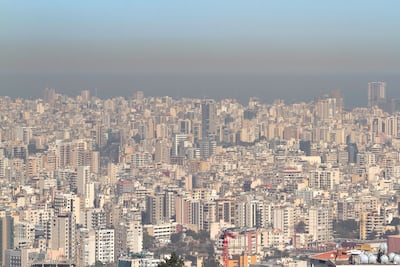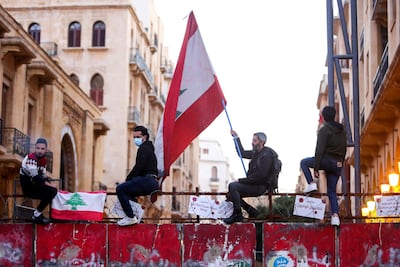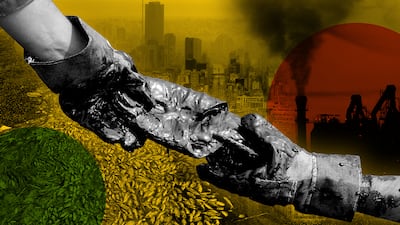Throughout history, environmental damage has been one of the most important factors in civilisational collapses. Environmental damage and climatic changes have driven crop failure, starvation and desertification, contributing to the collapse of many civilisations like the Peruvian Nazca, Easter Island, Norse Greenland, the Anasazi and the Roman Empire.
Coming down from the mountains in my country of Lebanon, a layer of thick brownish air covers the city of Beirut. It ominously reminds me of the severe smog in London and Los Angeles in the 1940s and 1950s caused by urban influxes and spikes in the number of cars and factories. In Beirut, the smog comes from diesel generators whirring across the country and most recently, toxic emissions due to the burning of carcinogenic low-quality fuel. This pollution of the air we breathe is visually and sensorially overwhelming, and I catch myself wondering whether Lebanon could one day join the sinister list of places where environmental damage has spiralled out of control.
Rampant environmental degradation in Lebanon is accelerating the total collapse not just of ecosystems, but of country, nation and culture. Coupled with socio-political shocks and exacerbated by the climate crisis, this degradation threatens our future. In the most unwanted ways, Lebanon is consistently demonstrating that the environment is interconnected with socio-economic stability, and is not something to be cast aside as a nature lover’s fancy.

A quick overview of the current situation is useful. After three decades of chronic electricity deficits–from supply shortages, expensive and polluting fuel and diesel oils, non-billing and a weak grid–the electricity sector in Lebanon has collapsed. State electricity barely provides a few hours per day, the country’s cities are dark at night, and pollution from diesel generators has risen by 300 per cent since the beginning of the crisis. The pollution brings heavy particles and carcinogen materials into the air, increasing wheezing, coughing, and bronchial irritations. The ripple effects of a fallen electricity grid are grave. Water is scarce as communities cannot pump groundwater, farm irrigation is being affected, and trees are being illegally cut down for wood heating in the winter.
Although Lebanon is a relatively water-rich country in the water-scarce Mena region, mismanagement, contamination, and run-off into the sea have compounded to create a grave water crisis. Last summer, the United Nations International Children's Emergency Fund (Unicef) warned that 71 per cent of Lebanon’s population risked running out of water. The water that does exist is often unsafe, with 92 per cent of wastewater in Lebanon disposed of without treatment. Over 96.2 per cent of our river water harbours fecal bacteria or coliforms and 95.5 per cent harbours the E coli bacteria.
Lebanon’s waste problem continues to affect the natural world and human lives. Collection is unreliable and the government barely provides funds or technical support for municipalities. Open dumping and burning are rampant and often the only option, amounting to an estimated 900 open dumps in the country. The solid waste sector produced 11 per cent of the country’s greenhouse gas emissions in 2011. In 2018, Lebanon lost $200 million due to the lack of solid waste management.
The mountains and hills that still have functioning ecosystems are consistently targeted. Due to corruption and spotty land records, unregulated development overtakes pristine areas, and faulty construction deals abound. For example in 2020 the World Bank infamously canceled its loan for a dam in Bisri, after local activism showed that construction would destroy a highly biodiverse ecosystem, multi-cultural historic sites, agricultural areas, and bird migratory areas.
Many are trying their hardest to help, from NGOs, to foreign actors, to citizens. However, structural problems have consistently undercut all efforts for change. Foreign aid is crippled by corruption and inefficiencies –over the past 30 years Lebanon has received billions of dollars in aid and yet running water and electricity are increasingly sparse. The nonprofit sector has attempted to take on the difficult task of filling in for the social state, but lack of co-operation and concerns about trustworthiness and partisan affiliation abound.
All this devastation is damaging an already fragile system, with Lebanon located in a climate change hotspot. In many ways, this is more dangerous than the Civil war which affected localised areas. This is an all-around war that has compromised the main essence of life. It has affected air and water, exposed the soil to erosion due to deforestation, and threatened our food supply.

Are there reasons to be optimistic? Can we at least delay the disaster if we cannot stop it? From my perspective, hope lies in grassroots movements led by the people who live through this crisis day in and day out. They need change the most urgently, are motivated to work towards new futures, and consistently create solutions through their knowledge of the place they belong to. Grassroots movements from the 2015 You Stink protests to the 2019 Thawra have been our closest shots at regime change and the building blocks towards it. Locally-born environmental and social initiatives run by passionate citizens are coming closer to systemic solutions than foreign aid. I witness this consistently through the Environment Academy at AUB, a community-born movement I co-founded in 2019 that addresses urgent environmental threats through the matching of local teams with expert mentors and the media. Environment Academy is showing us how collapse can create a push for transformation–whether in the attempt to secure water, clean up village-wide solid waste, or prevent forest fires. This moment is certainly dire, and the environment under real threat, but motivated citizens are bravely initiating ground-up transformation through their hard work at the local level.
Sustainably integrating these initiatives into Lebanese society is the challenge that will require local government and international players to listen to what is happening on the ground. The vacuum created by the current crisis in Lebanon could be a space for change, imagination, and transformation, as it could be the beginning of a longer downfall. Let us heed the warning signs of our polluted air and wildland fires to reimagine what life could look like after the storm.


